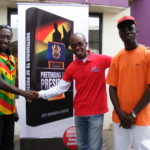Pretending to Be President is a book for everybody since we all are politicians. It’s also for persons with adept political tastes. This excellent storytelling has crafted a novel way of presenting contemporary satire, through an anthological method, constituting street theories of governance, conspiracies, expectations of citizens, realities of political office, political appointments, institutional challenges, the unplanned nature of Accra and other cities amongst others. It is propelled through cynical humor, which one might not agree with.
In some instances, you will get angry. Others you may get excited. It’s sometimes hilarious, sometimes painfully true, but indeed you get a complete picture of our body-politic and you also have an opportunity to decide what has changed in our politicians/politics – if any?
Spanning 8 years and 17 Chapters, what particularly intrigues me is the ability of the author to write about himself from the outside. Self-criticism is a virtue lost with most politicians and this book will blaze the trail for others to follow.
- Advertisement -
This book discusses salient and vital issues pertaining to the economy and prompts us to ask ‘how can we all look on and not say anything about what is going on’?
The author through very humorous suspense, has, I dare to state, instilled sophisticated fear in the reader and throws a challenge to all those who are politically romanced, by one political party or the other, to be more circumspect, and be more wary and wise, in reading into meanings of those seeking our mandate for political office, and what they do with this mandate once they gain it.
Without attempting to give a summary, readers should however look out for issues bordering on the divisive and polarized nature of our politics, where, the winner takes all tendencies serve to be our bane – politicians, having served in a particular government, are out of jobs and cannot contribute meaningfully to the nation once their party loses elections. The author clearly advances a correlation between losing human resource(s) and elections by stating the instance of Sweet Victory attendant with ‘Otwea’ a Twi word typifying a phrase like “it serves you right” or more crudely, “in your face”!
An interesting musing is the reflection(s) on the achievements or lack thereof in the nation’s economic growth symbolized by the futility of parades on March 6th (independence day).
The simple question is, “what are we marching for” When citizens are bemoaning the issues around bread and butter, clothes, food and shelter; education, health, good roads, water, jobs and not least agriculture plus more!
What have we been saying differently since independence?
Readers will identify with the musings here and indeed reflect on their own patterns of growth through the kind of education and job you are in now, and remember your marching days.
“Ghana is the first country to gain independence”.
What stands out uniquely is the encouragement by the author to let go of this assertion serving as a talisman that holds us back from achieving or even daring to achieve. The author literally warns us to come down from this political high horse, and propaganda, and not behave like ostriches, when we see that counting the years, we have not achieved much.
Employing backward and forward looking approaches, the issues are laid out realistically and gender dynamics are well elucidated, and here the talk was not about women but including demography, minorities amongst others.
Tackling corruption as outlined in Hotel President and the challenges of nepotism signifies how the rules of engagement change depending on who is on the receiving end. Corruption in the nation has not waned and it’s a social vice that must be emphasized over and over again. All across Africa this is endemic and has been our bane on the continent.
A Nation Shamed also brings into sharp relief the huge drug related issues which have plagues and pervaded our country and how the menace is now exclusively linked to the whole of West Africa. The warning is, No One is Safe – it is so entrenched that it is in our security agencies, and other organs and even lawmakers have fallen prey. A real canker for West Africa and all hands must be on deck in working to curb the situation.
I would have loved to read more on Northern dynamics where the author would have gone beyond chieftaincy in appreciating the conflicts in the north as well as other parts of the country.
In Stop this Nonsense which looks at issues of chieftaincy, insecurity in the north, and other parts of Ghana, this author would have been one of the best placed persons to be precise on predictions of politicians and offer the common man solutions to the intractable nature of these conflicts, but this is not really expanded though well outlined. It will be interesting to see how this can be done in the next volumes in the ‘irreverent series’.
It would have been interesting to read the author’s characterization of the media into some sort of categories and headline issues around news based on political biases, reportage, patronage and generally a sense of how the media fared. Highlighting Ghana Badcasting Cooperation however makes a poignant point on this.
The author establishes unabashedly that Hope is what most Ghanaians have for governance and good politicians, but Hope is neither a method nor panacea to development in Ghana!
This book looking at the country’s development through the eyes of the Ghanaian and persons who seek to understand the internal workings of politicians, decipher some of the irrational decisions and quagmires they find themselves in, and offer a perspective that is based on commonsense, which as we all know, is not common.
This is a book that is ‘unputdownable’, funny, annoying, painfully true, you will scream, and even sometimes shout, but it is set in a context that allows you to identify with!
It is a must read for all who want to effect a positive path for our nation. Without reservation, I heartily recommend this book: read it, write, debate and establish your own musings. I await the next series with glee!
This is an interesting book, one I expected from the author; who can be described as the
King of Contemporary Satire in this Most Irreverent Series!
*Nansata Yakubu is parliament and conflict expert with the Parliamentary Centre in Accra.


